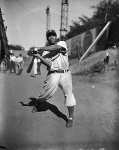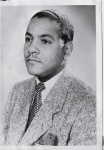Two African American Pioneers Cross Paths: Roy Campanella and Carl Rowan
This article was written by Joel Rippel
This article was published in The National Pastime: Baseball in the North Star State (Minnesota, 2012)
In May of 1948, two pioneers arrived at Lexington Park in St. Paul. One was Roy Campanella, who became the first African American to play in the American Association (which began play in 1902), when he was assigned to the St. Paul Saints by the Brooklyn Dodgers. Chronicling Campanella’s pivotal role was another African American pioneer reporter, Carl Rowan, who was just beginning his newspaper career after receiving a Master’s Degree from the University of Minnesota.
 But the career paths of Campanella and Rowan almost didn’t meet. Brooklyn Dodgers general manager Branch Rickey had considered sending Campanella to St. Paul earlier. In 1946, he placed Campanella in Nashua (New Hampshire) of the Class B New England League instead of St. Paul because he thought the American Association might not be ready to be integrated. In 1947, Campanella was sent to Montreal of the International League because Rickey, after considering the verbal abuse directed at Montreal’s Jackie Robinson by Louisville fans during the 1946 Junior World Series, still didn’t think the American Association was ready. Campanella began the 1948 season with the Brooklyn Dodgers before being farmed to St. Paul, where he was reunited with manager Walt Alston, who had managed Nashua in 1946.
But the career paths of Campanella and Rowan almost didn’t meet. Brooklyn Dodgers general manager Branch Rickey had considered sending Campanella to St. Paul earlier. In 1946, he placed Campanella in Nashua (New Hampshire) of the Class B New England League instead of St. Paul because he thought the American Association might not be ready to be integrated. In 1947, Campanella was sent to Montreal of the International League because Rickey, after considering the verbal abuse directed at Montreal’s Jackie Robinson by Louisville fans during the 1946 Junior World Series, still didn’t think the American Association was ready. Campanella began the 1948 season with the Brooklyn Dodgers before being farmed to St. Paul, where he was reunited with manager Walt Alston, who had managed Nashua in 1946.
One St. Paul newspaper reporter had anticipated Campanella joining the Saints. In the May 18 edition of the St. Paul Pioneer Press, Joe Hennessy wrote:
Never before has a Negro played in the American Association. Branch Rickey gave at least a hint that this move had been planned for some time when he watched the Saints in spring training at Fort Worth.
He shattered a precedent or two there by playing a Negro with the Dodgers against both Fort Worth and Dallas—the first time it had been tried in the state of Texas.
Afterwards he explained that any baseball man who would not make use of a good player, regardless of color, was just not showing good business judgment.
Campanella joined the Saints on May 22 in Columbus, Ohio.
The Minneapolis Spokesman, an African American newspaper, said in its May 28 edition, that Campanella would “be well received in the Twin Cities. Comment of Twin City fans and sports writers alike, indicates that the peppery backstop will be accepted as just another ballplayer.” Campanella’s play ensured that. He made his Minnesota debut in a Memorial Day twin-bill between the Saints and the Minneapolis Millers (with a game in each team’s home park).
 In the next edition of the Minneapolis Spokesman, Rowan, now on staff at the paper, wrote that Campanella was “a big hit with fans in St. Paul and Minneapolis.”
In the next edition of the Minneapolis Spokesman, Rowan, now on staff at the paper, wrote that Campanella was “a big hit with fans in St. Paul and Minneapolis.”
Rowan summed up Campanella’s initial appearance in Minnesota, writing: “Nobody seemed bothered that the first Negro was playing triple A baseball on their fields. Few, indeed, seemed to wonder why it had taken so long.”
Over the next month Campanella continued to impress the fans.
In late June, Rowan mentioned some of Campanella’s highlights in the Minneapolis Spokesman: a home run in six consecutive games, 20 RBIs in one week and raising his batting average to .346. All of which made Campanella, “a tremendous favorite of St. Paul fans.”
Rowan added that Saints fans had become “fearful Brooklyn might recall him.”
Rowan continued, “It would be a terrific blow to the fans if the spunky, quiet-mannered catcher were recalled. He has completely soothed any hard feelings the fans had over not getting Duke Snider [who had been with the Saints in 1947 but was assigned to Montreal in 1948].”
According to Rowan, Campanella was enjoying his stay in St. Paul. Campanella and his family were renting an apartment from a St. Paul couple. On the road, Campanella stayed in the team’s hotel except in Kansas City and Louisville, where he stayed with families.
Campanella told Rowan that there hadn’t been any incidents in any city and that he “expected none.”
On June 30, the Dodgers recalled Campanella. Rowan wrote in the July 9 edition of the Minneapolis Spokesman, “… and the Saintly City’s baseball fans weren’t the least bit happy about it. Although the fans admitted they disliked the move, many paused to say that they wished Campy a lot of luck in the big show.”
In 35 games with the Saints, Campanella batted .325 with 13 home runs and 39 RBIs.
Campanella would go on to be the Dodgers’ starting catcher for ten seasons—earning eight All-Star selections and being named the National League MVP three times.
Rowan joined the Minneapolis Tribune later in 1948. Over the next decade he would become one of just a few African American journalists covering civil rights issues in the South. He wrote five novels on racial issues and in 1960 wrote Jackie Robinson’s biography, Wait Till Next Year: The Life Story of Jackie Robinson.
In the late 1950s, Rowan was a mentor to the first group of African American scholarship athletes at the University of Minnesota—a group which included future Pro Football Hall of Famer Bobby Bell.
In the early 1960s, Rowan joined the U.S. State Department. He later served as the U.S. Ambassador to Finland and as the head of the United States Information Agency. Rowan eventually returned to newspapers and became a nationally syndicated columnist.
JOEL RIPPEL is the author of seven books on Minnesota sports history. Rippel, a graduate of the University of Minnesota, is a member of the Society for American Baseball Research and resides in Minneapolis.
Sources
Lanctot, Neil. Campy: The Two Lives of Roy Campanella. New York: Simon & Schuster, 2011.
Lowenfish, Lee. Branch Rickey: Baseball’s Ferocious Gentleman. Lincoln, NB: Bison Books, 2009.
Rippel, Joel A. 75 Memorable Moments in Minnesota Sports. St. Paul, MN: Minnesota Historical Society Press, 2003.
Rowan, Carl. Wait Till Next Year: The Life Story of Jackie Robinson. New York: Random House, 1960.
Newspapers
Minneapolis Spokesman, St. Paul Dispatch, and St. Paul Pioneer Press.


